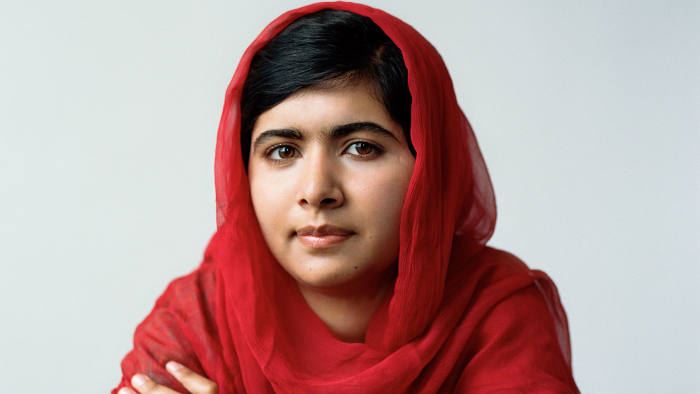 Malala Yousafzai https://www.ft.com/content/044f12ac-612f-11e3-916e-00144feabdc0Malala Yousafzai: The Teenager that Shaped Global Education
Malala Yousafzai https://www.ft.com/content/044f12ac-612f-11e3-916e-00144feabdc0Malala Yousafzai: The Teenager that Shaped Global Education
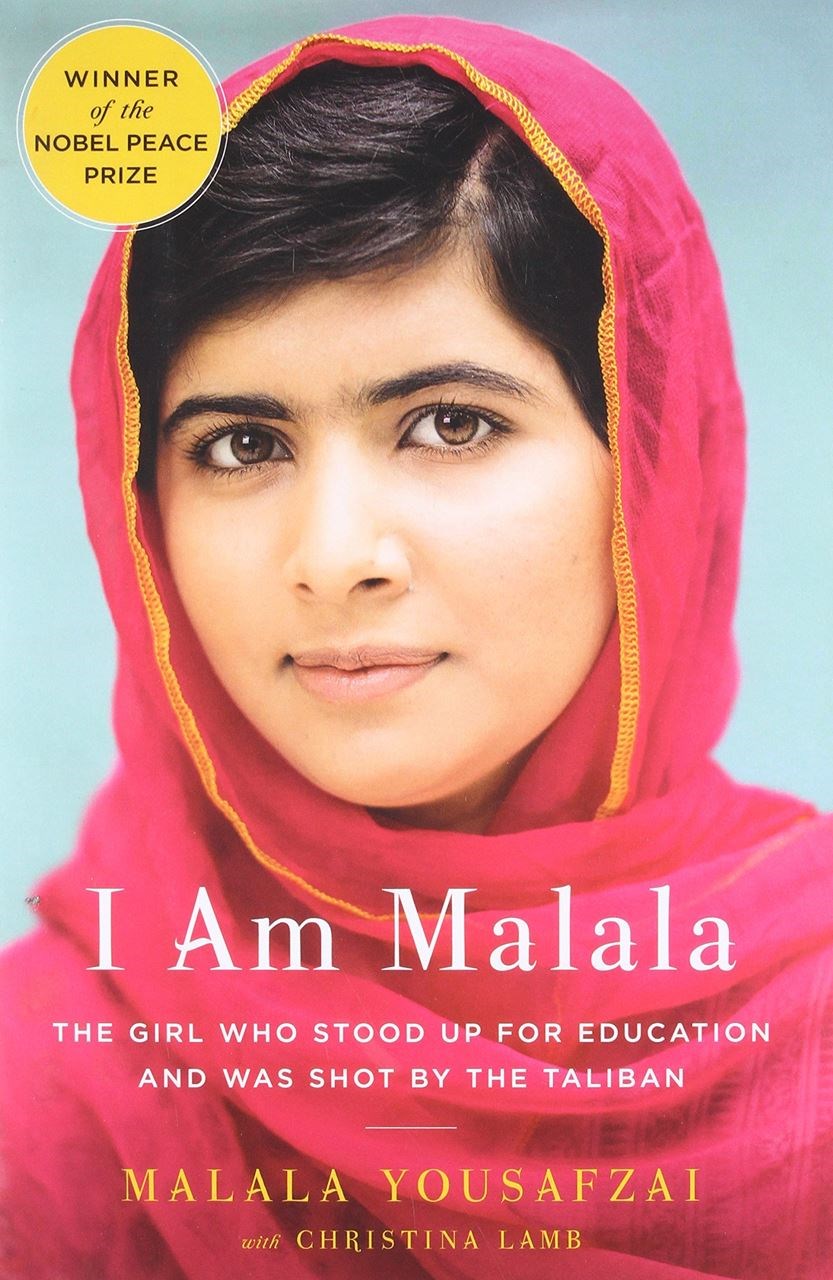 "I am Malala", an autobiography, sold millions of copies and became a New York Times Bestseller.https://www.amazon.com/Am-Malala-Stood-Education-Taliban/dp/0316322407 Lead vocalist for the rock band My Chemical Romance, Gerard Way, once declared that “Heroes are ordinary people who make themselves extraordinary.” Many people imagine heroes as persons who are gifted with extraordinary power or intelligence. However, as Gerard Way posits, true heroism is not born--it is made. Heroism is made by people in hard circumstances who make the decision to rise above their fears and the pressures of society to do the right thing. A hero worthy of admiration needs to have desire for change. This does not mean that the individual needs to be wealthy or famous; it means that the individual is constantly fighting for his or her beliefs and does not give up when obstacles are thrown at them. Heroism comes in a wide spectrum of instances: from a mother giving up her career to spend more time with her children to a middle school student standing up for his classmate getting bullied by his group of friends. Of course, some would not consider the mother worthy enough to be entitled a hero. After all, they might say, is she not simply giving up on her career? But her willingness to fight societal pressures to succeed and give up her own career ambitions to be a better mother demonstrates the sacrifice that heroes must give for the sake of their beliefs. Ultimately, I believe that the mother and the middle school student are both equally worthy of carrying the title of a hero because an individual worthy of the title of a hero must possess persistence and bravery to fight societal pressures so that he or she can impact and influence society for the better.
"I am Malala", an autobiography, sold millions of copies and became a New York Times Bestseller.https://www.amazon.com/Am-Malala-Stood-Education-Taliban/dp/0316322407 Lead vocalist for the rock band My Chemical Romance, Gerard Way, once declared that “Heroes are ordinary people who make themselves extraordinary.” Many people imagine heroes as persons who are gifted with extraordinary power or intelligence. However, as Gerard Way posits, true heroism is not born--it is made. Heroism is made by people in hard circumstances who make the decision to rise above their fears and the pressures of society to do the right thing. A hero worthy of admiration needs to have desire for change. This does not mean that the individual needs to be wealthy or famous; it means that the individual is constantly fighting for his or her beliefs and does not give up when obstacles are thrown at them. Heroism comes in a wide spectrum of instances: from a mother giving up her career to spend more time with her children to a middle school student standing up for his classmate getting bullied by his group of friends. Of course, some would not consider the mother worthy enough to be entitled a hero. After all, they might say, is she not simply giving up on her career? But her willingness to fight societal pressures to succeed and give up her own career ambitions to be a better mother demonstrates the sacrifice that heroes must give for the sake of their beliefs. Ultimately, I believe that the mother and the middle school student are both equally worthy of carrying the title of a hero because an individual worthy of the title of a hero must possess persistence and bravery to fight societal pressures so that he or she can impact and influence society for the better.
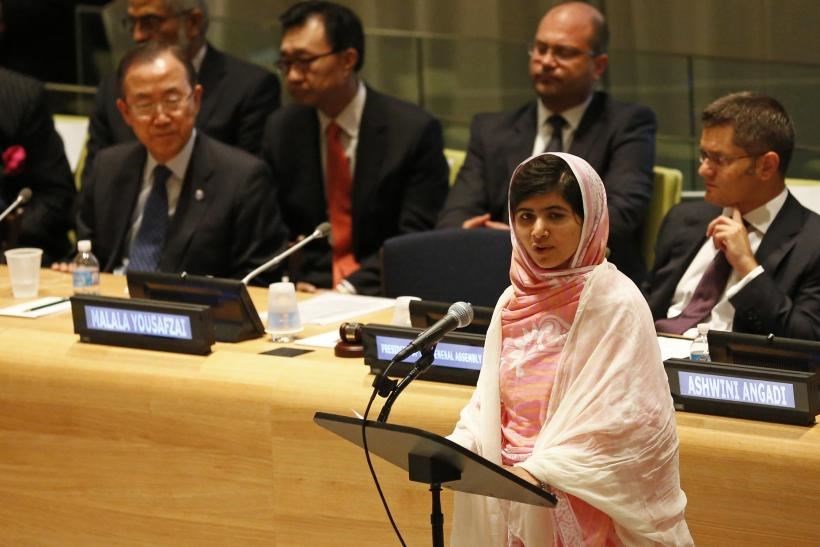 Malala Yousafzai speaking at the United Nations Headquarters in New Yorkhttps://www.ibtimes.com/malala-yousafzais-speech-un-full-text-1344117 Malala Yousafzai, an active advocate for girls’ educational rights, is one such hero due to her impressive ability to speak out on issues that matter to her. Yousafzai was born in the Swat district of Pakistan on July 12, 1997, and ever since she was eleven years old, she advocated for equal educational rights for boys and girls. Despite the Taliban’s efforts to shut her activism down, Yousafzai persevered through death threats and a bus shooting. She used her experiences to write an autobiography titled “I am Malala” which became a New York Times Bestseller--over 1.8 million copies were sold worldwide. Through her inspirational story, she gained attention from leaders all around the world and was invited to speak at the United Nations Headquarters in New York about her activism against the Taliban--an active terrorist group who are against girls educational rights. She became known for being the youngest individual to win the Nobel Peace Prize when she was only seventeen, and she became the co-founder of the Malala Fund-- an international non-profit organization that helps fight for equal educational rights (quoted in “Malala Yousafzai”). Malala Yousafzai’s passion for the educational rights of girls has made her a hero who braves threats and dangers to speak out for her fellow students and persevere in her advocacy despite physical and mental hardship.
Malala Yousafzai speaking at the United Nations Headquarters in New Yorkhttps://www.ibtimes.com/malala-yousafzais-speech-un-full-text-1344117 Malala Yousafzai, an active advocate for girls’ educational rights, is one such hero due to her impressive ability to speak out on issues that matter to her. Yousafzai was born in the Swat district of Pakistan on July 12, 1997, and ever since she was eleven years old, she advocated for equal educational rights for boys and girls. Despite the Taliban’s efforts to shut her activism down, Yousafzai persevered through death threats and a bus shooting. She used her experiences to write an autobiography titled “I am Malala” which became a New York Times Bestseller--over 1.8 million copies were sold worldwide. Through her inspirational story, she gained attention from leaders all around the world and was invited to speak at the United Nations Headquarters in New York about her activism against the Taliban--an active terrorist group who are against girls educational rights. She became known for being the youngest individual to win the Nobel Peace Prize when she was only seventeen, and she became the co-founder of the Malala Fund-- an international non-profit organization that helps fight for equal educational rights (quoted in “Malala Yousafzai”). Malala Yousafzai’s passion for the educational rights of girls has made her a hero who braves threats and dangers to speak out for her fellow students and persevere in her advocacy despite physical and mental hardship.
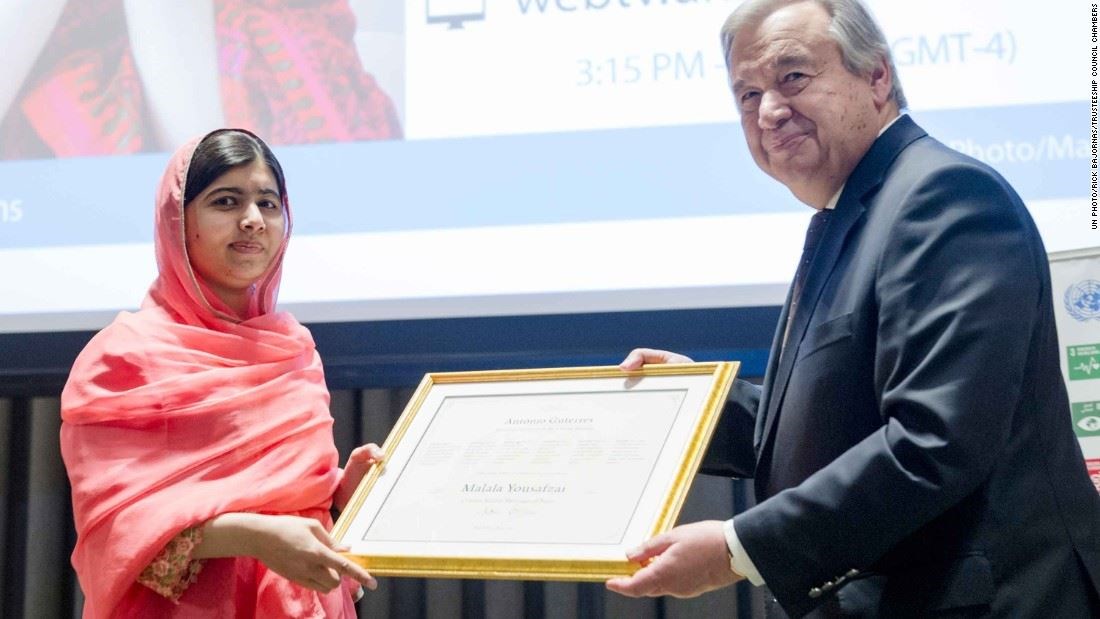 Yousafzai won the Nobel Peace Prize at 17.https://www.cnn.com/2017/04/11/asia/malala-un-messenger-of-peace/index.html Despite the danger, Malala’s bravery in always speaking out for girls’ rights to education serves as an example to teenage girls everywhere. Although the Taliban threatened Malala’s family because of her continued activism, Malala responded courageously, claiming that, “‘The Taliban could take our pens and books, but they could not stop our minds from thinking.’” (Yousafzai, “I Am Malala” 77) Malala demonstrates her bravery by speaking out against an active terrorist group--which most adults would cower from doing. Despite her young age, Malala continues to take action to ensure that people are aware of how the Taliban created a broken educational system in Pakistan. The situation she was in was emotionally draining and stressful; imagine having to face threats that could potentially harm not just you, but also your family when you are only fifteen years old. Malala put her family and herself in more danger by calling out the Taliban specifically because she believed the cost of global equal education was more valuable. Only nine months after she was shot in the head, Yousafzai spoke at the United Nations in New York City to urge political leaders from all over the world to fight alongside her and find inspiration through her story to take action for equal educational rights: “weakness, fear, and hopelessness died. Strength, power, and courage was born” (Yousafzai, “Check Against Delivery” 2). Yousafzai uses antithesis to explain the strength that was born from her refusal to back down from the Taliban and it is effective because it sets an example to girls that “what does not kill you makes you stronger.” Her words show that after people face their fear, they gain courage and bravery. This speech raises Malala’s level of heroism as she finds the strength to advocate more about education instead of cowering from the extreme threats she received. Thus, Malala’s bravery in always speaking out about her beliefs make her an ideal hero.
Yousafzai won the Nobel Peace Prize at 17.https://www.cnn.com/2017/04/11/asia/malala-un-messenger-of-peace/index.html Despite the danger, Malala’s bravery in always speaking out for girls’ rights to education serves as an example to teenage girls everywhere. Although the Taliban threatened Malala’s family because of her continued activism, Malala responded courageously, claiming that, “‘The Taliban could take our pens and books, but they could not stop our minds from thinking.’” (Yousafzai, “I Am Malala” 77) Malala demonstrates her bravery by speaking out against an active terrorist group--which most adults would cower from doing. Despite her young age, Malala continues to take action to ensure that people are aware of how the Taliban created a broken educational system in Pakistan. The situation she was in was emotionally draining and stressful; imagine having to face threats that could potentially harm not just you, but also your family when you are only fifteen years old. Malala put her family and herself in more danger by calling out the Taliban specifically because she believed the cost of global equal education was more valuable. Only nine months after she was shot in the head, Yousafzai spoke at the United Nations in New York City to urge political leaders from all over the world to fight alongside her and find inspiration through her story to take action for equal educational rights: “weakness, fear, and hopelessness died. Strength, power, and courage was born” (Yousafzai, “Check Against Delivery” 2). Yousafzai uses antithesis to explain the strength that was born from her refusal to back down from the Taliban and it is effective because it sets an example to girls that “what does not kill you makes you stronger.” Her words show that after people face their fear, they gain courage and bravery. This speech raises Malala’s level of heroism as she finds the strength to advocate more about education instead of cowering from the extreme threats she received. Thus, Malala’s bravery in always speaking out about her beliefs make her an ideal hero.
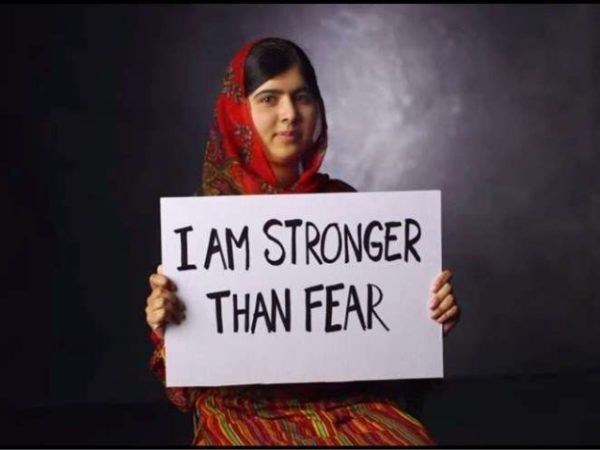 Malala Yousfzai campaigns for equal educational rights all over the world.https://enezaeducation.com/7-reasons-why-we-should-emulate-malala-yousafzai/ Yousafzai’s heroism is conveyed through her persistence after the near-fatal attack from the Taliban which drives the global advocation of girls' educational rights. In her speech “Check Against Delivery,” Yousafzai portrays her never-ending will to give up: “‘They thought that the bullets would silence us. But they failed. And then, out of that silence, came thousands of voices’” (Yousafzai, “Check Against Delivery” 2). Malala explains how the shooting attack driven by hate and fear made her emotionally stronger and more determined to fight for equal education. In her recovery, she displays her resilience as to how the Taliban’s attempt to shut her down failed. Yousafzai exemplifies the concept of perseverance by tackling threats and spreading awareness to support other girls in her fight of activism. In her speech at the United Nations, Malala empowers others to take action for change as she shares her story and says, “‘No one can stop us. We will speak for our rights and we will bring change through our voice. We must believe in the power and the strength of our words. Our words can change the world.’” (Yousafzai, “Check Against Delivery 4). Even though her refusal to silence herself is what made her the Taliban’s main target, Malala uses her voice as a weapon to represent the continual fight for girls' educational rights. For many, death threats from an active terrorist group would have been too much to bear. For Malala, these death threats were not enough to stop her from speaking out against the unfair educational system. Like a hero, Malala did not let these hardships get in the way of her advocating girls educational rights as she overcame them.
Malala Yousfzai campaigns for equal educational rights all over the world.https://enezaeducation.com/7-reasons-why-we-should-emulate-malala-yousafzai/ Yousafzai’s heroism is conveyed through her persistence after the near-fatal attack from the Taliban which drives the global advocation of girls' educational rights. In her speech “Check Against Delivery,” Yousafzai portrays her never-ending will to give up: “‘They thought that the bullets would silence us. But they failed. And then, out of that silence, came thousands of voices’” (Yousafzai, “Check Against Delivery” 2). Malala explains how the shooting attack driven by hate and fear made her emotionally stronger and more determined to fight for equal education. In her recovery, she displays her resilience as to how the Taliban’s attempt to shut her down failed. Yousafzai exemplifies the concept of perseverance by tackling threats and spreading awareness to support other girls in her fight of activism. In her speech at the United Nations, Malala empowers others to take action for change as she shares her story and says, “‘No one can stop us. We will speak for our rights and we will bring change through our voice. We must believe in the power and the strength of our words. Our words can change the world.’” (Yousafzai, “Check Against Delivery 4). Even though her refusal to silence herself is what made her the Taliban’s main target, Malala uses her voice as a weapon to represent the continual fight for girls' educational rights. For many, death threats from an active terrorist group would have been too much to bear. For Malala, these death threats were not enough to stop her from speaking out against the unfair educational system. Like a hero, Malala did not let these hardships get in the way of her advocating girls educational rights as she overcame them.
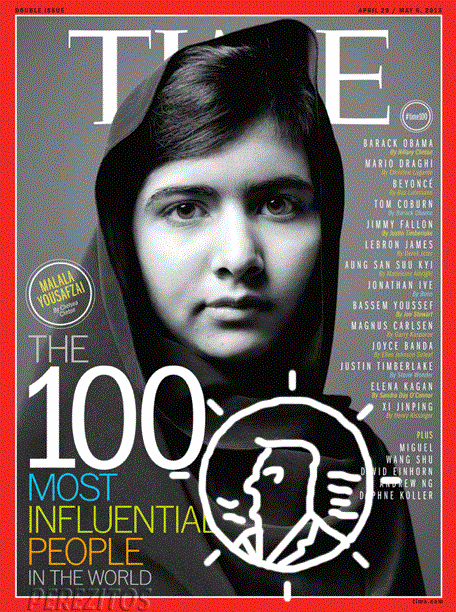 Malala Yousfzai was featured in one of TIME Magazine's "100 Most Influential People".https://perezhilton.com/malala-yousafzai-youngest-nobel-peace-prize-in-history-kailash-satyarthi/ Despite all the dangers she has had to struggle through, Malala Yousafzai has continued to bravely speak out for the educational rights of girls not only in Pakistan but all over the world. By sharing her resilient story of getting shot by a terrorist and still continuing to protest for equal education, Malala inspires other girls to also never stop fighting for their right to go to school, even if the law prohibits them. Yousafzai challenges society and its norms to encourage change; just because it is the letter of the law does not mean that it is right. Her story is not what makes her a hero, but the way she recovered and continued to fight for girls equal educational opportunities makes her a hero. Because of her courage, more teenage girls, as well as myself, became aware about the oppression against women in communities all over the world. Yousafzai rose above her hardships to create change at a larger level; even after she moved to England where she is granted equal opportunities to education, she risks her family and her own well being by continuing to advocate for girls educational rights globally. Malala sparked motivation in me to fight for equal education because I live in a community where I am given free education, and she has taught me that I should not take it for granted. Not only has her story made me realize that being able to go to school five days a week is a gift, but also that I should take advantage of my resources to reach my strongest potential. Because of her, I am now a better individual as I understand that I should speak out not only when it is convenient for myself, but for my peers. Malala is like the real, human version of Wonder Woman-- she serves as an inspiration to people all over the world, constantly fights for her beliefs, and most of all, is a hero.
Malala Yousfzai was featured in one of TIME Magazine's "100 Most Influential People".https://perezhilton.com/malala-yousafzai-youngest-nobel-peace-prize-in-history-kailash-satyarthi/ Despite all the dangers she has had to struggle through, Malala Yousafzai has continued to bravely speak out for the educational rights of girls not only in Pakistan but all over the world. By sharing her resilient story of getting shot by a terrorist and still continuing to protest for equal education, Malala inspires other girls to also never stop fighting for their right to go to school, even if the law prohibits them. Yousafzai challenges society and its norms to encourage change; just because it is the letter of the law does not mean that it is right. Her story is not what makes her a hero, but the way she recovered and continued to fight for girls equal educational opportunities makes her a hero. Because of her courage, more teenage girls, as well as myself, became aware about the oppression against women in communities all over the world. Yousafzai rose above her hardships to create change at a larger level; even after she moved to England where she is granted equal opportunities to education, she risks her family and her own well being by continuing to advocate for girls educational rights globally. Malala sparked motivation in me to fight for equal education because I live in a community where I am given free education, and she has taught me that I should not take it for granted. Not only has her story made me realize that being able to go to school five days a week is a gift, but also that I should take advantage of my resources to reach my strongest potential. Because of her, I am now a better individual as I understand that I should speak out not only when it is convenient for myself, but for my peers. Malala is like the real, human version of Wonder Woman-- she serves as an inspiration to people all over the world, constantly fights for her beliefs, and most of all, is a hero.
Works Cited
Google Search, Google, www.google.com/search?q=definiton+of+hero&rlz=1CAPQVW_enUS846&oq=definiton+of+hero&aqs=chrome..69i57j0l5.3026j1j7&sourceid=chrome&ie=UTF-8&safe=active&ssui=on.
Rezaian, Jason. "Malala has a message for President Trump on women's rights." Washington Post, 25 Jan. 2018. Biography In Context, https://link.galegroup.com/apps/doc/A524948853/BIC?u=powa9245&sid=BIC&xid=57825060. Accessed 3 Apr. 2019.
"Malala Yousafzai." Gale Student Resources in Context, Gale, 2017. Student Resources In Context, https://link.galegroup.com/apps/doc/PBTIMW863742142/SUIC?u=powa9245&sid=SUIC&xid=5c0df0ee. Accessed 2 Apr. 2019.
Yousafzai, Malala. “Check Against Delivery.” United Nations Headquarters, New York. 12 June 2013.
Yousafzai, Malala. I Am Malala: the Story of the Girl Who Stood Up for Education and Was Shot by the Taliban. Little Brown & Co, 2013.
Yousafzai, Malala. "Malala Yousafzai: standing up for girls." Washington Post, 14 July 2014. Biography In Context, https://link.galegroup.com/apps/doc/A374763434/BIC?u=powa9245&sid=BIC&xid=ec8afd29. Accessed 2 Apr. 2019.
Page created on 5/21/2019 4:54:45 AM
Last edited 6/19/2019 7:56:34 PM
